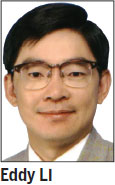Education of Hong Kong youth needs improving
Updated: 2014-11-21 07:49
By Eddy Li(HK Edition)
|
|||||||
Not long after the authorities cleared one of the "Occupy Central" sites, dozens of masked activists wearing helmets and goggles stormed the Legislative Council (LegCo) in Admiralty. They clashed with police in the early hours of Wednesday. They claimed they were expressing their concerns with the recent conduct of the SAR government.
For me and to every citizen in the territory who watched this violent behavior unfolding live on television - even for the "pro-democratic" lawmakers and Hong Kong Federation of Students (HKFS) members - those young protesters actions were contemptible. They perpetrated deliberate acts of violence.
The whole "Occupy" campaign, essentially, is a farce orchestrated by cynical politicians. Later, it was hijacked by young activists. But fundamentally, all those people are taking advantage of the youth of Hong Kong to promote their own agenda. It is ironic that while Germany was celebrating the 25th anniversary of the fall of the Berlin Wall and reunification of Germany earlier this month, some Hong Kong people are trying to separate the territory from the nation.
Unification greatly benefited Germany, serving to cement its place as the strongest economy in Europe. It now accounts for almost 27 percent of the region's GDP. Similarly, Hong Kong has also benefited tremendously from its handover back to China 17 years ago. Thanks to policies specially granted by the central government, since 1997 Hong Kong has enjoyed fast, stable economic growth. The city offers a proliferation of business opportunities. Hong Kong people have the chance to enjoy affluent, enjoyable lives. But now, as the SAR is poised to enter a new stage of democracy - universal suffrage from 2017 - there are those, claiming to be democrats, who are trying to stop this progress. They are using radical and violent tactics. They have not only obstructed Hong Kong's political reforms, but hindered its normal economic activities. Ultimately, ordinary people will suffer most.

According to media reports, most of the violent protesters this time are teenagers. This reminds me of a comment by former financial secretary Antony Leung at the launch of the Our Hong Kong Foundation, that it was a "mistake" for the SAR government to attach insufficient importance to youth issues - especially education. To some degree, I agree with this.
The government has somehow overlooked the problems facing young people. Right after the handover, there were voices suggesting the territory's school curricula needed revision. This was because the colonial government had deliberately omitted any reference to modern Chinese history (i.e. the period after the establishment of the People's Republic of China in 1949).
Moreover, the Basic Law should be included in the course to improve students' knowledge of Hong Kong and the nation, so as to encourage patriotism and a sense of belonging.
Unfortunately the government did not seize the opportunity to do this. Instead, the subject of Chinese History was abolished and replaced by Liberal Studies as a compulsory subject for high school students.
However, the government provided no concrete framework for this new compulsory course. It gave teachers the freedom to decide what to teach their students. Consequently, this has allowed some politically biased teachers to add anti-Beijing material to the curriculum. As a result, many students have been misled by the biased views of some teachers, and a limited or wrong understanding of their own country. For years, the central government has been demonized by politically biased teachers. Students brought up in such conditions tend to be easily tempted to street politics maneuvered by politicians with ulterior motives.
At the moment, the second batch of recommendations under the New Academic Structure medium-term review is still underway. Views on the future framework for Liberal Studies are still being collected. Some have suggested changing this compulsory course into a non-compulsory subject. I don't think this is an urgent issue. It is more important that the government add national education and the Basic Law as compulsory subjects in the curriculum.
The author is vice-president of the Chinese Manufacturers' Association of Hong Kong.
(HK Edition 11/21/2014 page1)